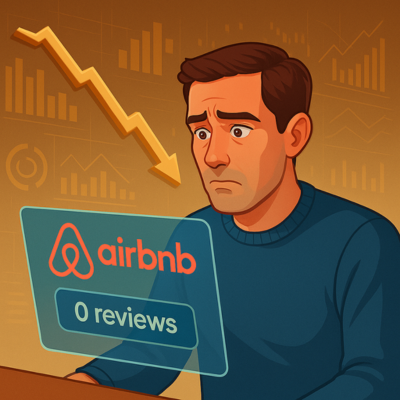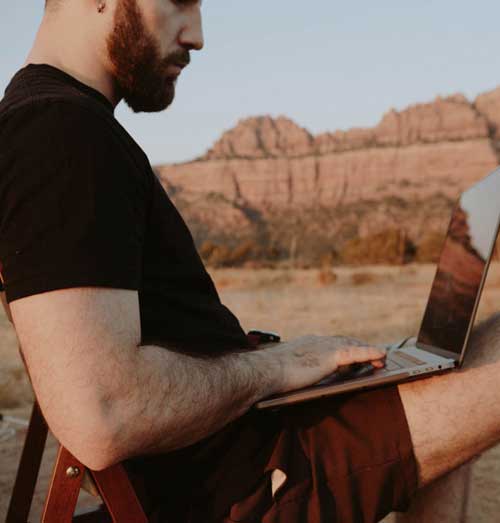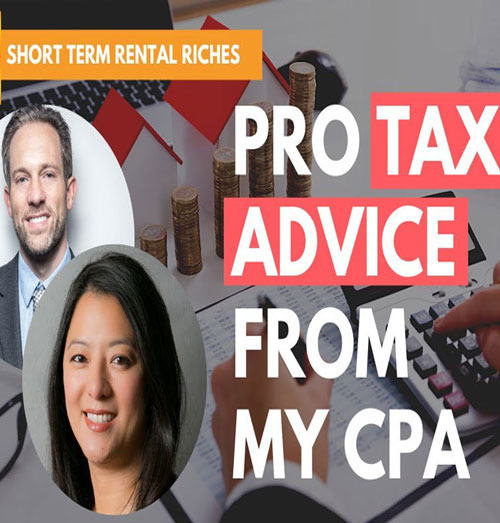What do 10 million new Airbnb guests mean for your STR?
A lot, especially if you’re unknowingly filtering them out. In this episode, we unpack why welcoming first-time guests isn’t a risk, it’s a missed opportunity if you’re not prepared. Learn how to vet, host, and profit from new users with confidence.
• Find out why so many top hosts are missing out on high-paying, first-time guests.
• Learn the pros and cons of accepting new users—and how to screen smartly.
• Discover the red flags that matter (and which ones don’t) when vetting first-time bookings.
• See why big events like concerts and the Olympics bring a flood of new, profitable guests.
• Get the exact tools, messages, and house rules we use to protect properties and boost loyalty.
OUTRO
Every experienced guest started as a first-time guest and some of your best future bookings will too. With the right systems, you don’t just protect your property, you unlock more revenue and better reviews. Subscribe for more episodes like this, share with a fellow host, and grab the free house rules template in the show notes. Let’s grow your business, one great guest at a time.
Resource Links:
Check out our videos on YouTube: https://www.youtube.com/@ShortTermRentalRiches
Grab your free management eBook: https://strriches.com/#tools-resources
Looking to earn more with your property (without the headaches)? Chat with our expert management team: https://strriches.com/management-services/
In 2024, just Airbnb saw over 10 million new guest signups. So the question is, are you capitalizing on that?
My team and I have managed over 50,000 guests over the last 10 years or so, and we’ve learned a thing or two about hosting first time guests.
New Airbnb guests aren’t the problem. Your process is the problem.
In this episode, we’re gonna break down the pros, the cons, and the best practices for accepting first time guests and share some smart policies that protect your property while maximizing your revenue potential.
so, so why is this topic important? Why is the idea of accepting new guests important? Well, ’cause there’s a lot of new guests, millions of new guests every year. Just last year, Airbnb had over 10 million new guests. And now while not all of those were in the US, a lot of those were global. That’s still millions, very likely, millions of guests that stayed in properties for the first time in the us.
Now we are able to identify a little bit where these new guests decide to stay, who these new guests are. And so a couple points there. One is that if you have a brand new listing that has zero pass guests, while new guests are more likely to stay in listings that have no prior reviews.
And the amount of guests sane at properties where a Superhost is host to them is much less because a lot of these superhosts have filtered out the ability for new guests to book at their property. There is a filter within Host Away as a host. That you can check and it says your guest needs prior experience.
So a lot of superhosts that have been through the challenges sometimes of having new guests have decided to opt out of this. But we know that there’s a lots and lots, millions of new good guests Staying at our property each and every day, and the problem is not with the new guests.
The problem is with your setup and your operations and how you’re vetting these guests. We know that a lot of new guests come around in times of high demand, so maybe there’s a big event in a city. Maybe Taylor Swift is heading to a city and all the hotels are booked up. Well, people recognize this. They put their properties up for rent because they know they can get top dollar, especially if it’s Taylor Swift coming.
We also see that more new guests are staying during times of high demand. So if we think about Taylor Swift coming to town, for example, and all the hotels get booked up, well, these guests are often not gonna stay in the hotel because they’re not available, but they still want to see Taylor Swift,
So they broaden their search and they end up staying in an Airbnb, and they very often end up really enjoying it or think about the Olympics happening in the city, for example. Any sort of big event is an area where a lot more new guests are going to come. And during these high demand times, these new guests are paying top dollar.
And so if you have them filtered out And they’re not able to see your property well, you could be missing out on some really high income days. We also know that younger demographics really enjoy experiences. They really enjoy traveling more. Not to say that older generations don’t.
I think just globally speaking, everyone is traveling more because it’s easier and because we have more options. But a lot of younger people are showing up for the first time as new Airbnb guests, and it may just be because they’ve actually passed the age range where they can book themselves.
So this is a really important topic.
yes, first time guest does cause a little bit of uncertainty, but there are some easy ways to combat those potentially negative guests. Let’s talk about the pros and cons of hosting a first time guest.
So one of the most clear pros is that there’s less competition from other hosts. ’cause if we take, let’s just take a hundred properties, and if 40% of them have filtered out or prevented first time guests from staying, well then that means instead of you competing with a hundred properties, if you’re only competing with 60.
So that is the first piece. There’s just less competition.
A second pro is that a lot of times when a guest stays at your property stays in an Airbnb, and maybe they’ve never stayed in a short term rental before, they end up really liking it, right? Airbnb didn’t grow to have hundreds of millions of guests. From people that are having bad experiences, and so you can create some really good loyalty with first time guests.
If they stay with your property, they had a great time, they went on vacation with their family. They may book your property right away for the next year, and so this can help with repeat guests.
Many guests are just simply new. They’re not risky. And we know this. My team and I have managed over 50,000 guests. We of course, have had some challenging guests, you could say, but we’ve hosted lots and lots of first time guests. We have a good process in place and I’m gonna provide those tips for you here in just a second.
But had we never accepted those guests in the first place, undoubtedly our revenue would’ve been impacted.
Remember you were also a first time guest at one point, just like me. I stayed in my first short-term rental, I think all the way back in 2012,
And of course, this whole short-term rental space has really changed my life, changed my world. It’s all that we do now. If you’re new to the show and you didn’t know my team and I manage properties around the world, we’re in dozens of cities. We would love to help you with yours. If you’re interested in learning more, you can go to s str riches.com.
There’s a little partner with us button. We’d love to chat with you, see if your property makes a good fit.
Okay, so we talked about the pros. Some of those are obvious. Let’s go ahead and jump into the cons.
And the first one is simply that we don’t have any prior information or knowledge of this guest past booking behavior. We have no reviews to go back and look at and see if hosts were praising them or they had something negative to say.
But if we look at the numbers, the numbers of bad reviews that new guests are actually receiving, it’s very, very small. Somewhere between two and 5%. And part of that bad review might be your fault. I know that sounds a little crazy, but it might be that you didn’t set the right expectations. And so this guest is brand new.
They’ve never used the platform before, and maybe your listing didn’t talk about everything that it needed to. Maybe you are sort of assuming that your guests would know Certain things with the check-in or whatever it happens to be. The reality is, is if we have a new guest check-in in our property, we want to be proactive.
Maybe you send a little message that says, Hey, really excited that you’re staying in your first Airbnb. We hope that your stay with us will be memorable for years and years to come, whenever it happens to be. But you can lay that out for ’em. Let ’em know that you’re there if they have any questions, knowing that they’re new to the platform.
So, yes, there is a con there. We, we don’t, as hosts have any historic information and actually the likelihood of one of these new guests breaking our house rules or our rental agreement, it is a little bit higher than a seasoned guest or someone that’s used Airbnb a lot before.
Again, this could go back to their expectations. Maybe you have a house rule that says take out the trash at the end of your day. And they’ve never stayed in an Airbnb. They’re used to hotels and so they don’t take the trash out, which you shouldn’t be asking them to take the trash out. Uh, and then essentially they break your house rule,
New guests are also going to lead to more support calls, so again, they’re new to the platform, they don’t quite understand it, and if there’s something sort of outta the ordinary that happens or it doesn’t meet their expectations. They’re more likely to pick up the phone and call Airbnb support because they’re used to coming from other platforms, or they’re used to just booking hotels where they can pick up the phone and call reception.
Okay, so there’s some obvious pros there. There’s some obvious cons. Let’s go ahead and talk about some of the policies that you want to have in place to make sure that you’re protecting your property.
The first one is make sure that you have the box checked to require them to have a government id.
Make sure that you’ve looked into your cancellation policy and you have one set up that fits well with your property. A lot of times we want to take the average cancellation policy in our market. If we have a super strict one, but everyone else has a very flexible one, then that’s going to limit the amount of people that want to stay at our property.
So take a quick look at that, and of course, we want to have some protection on our property, right? If we’re on Airbnb, then we do have their air cover, which can be really helpful.
If we’re accepting new guests on a platform outside of Airbnb, well then we either want to have a security deposit or we want to have some sort of damage waiver where we’re charging the guests, and then we’re purchasing insurance on that specific reservation. We use a company called Wavo with a lot of our properties.
The next step we want to take is make sure that we have some of the normal home automation devices in place, and the first one being a smart lock so that each of our guests have a unique code. It expires after their stay, but you can take it a couple steps further. There’s some really good technology these days, by company called Noise Aware, another one called Minute, where you can put these noise sensors in your property and they will trigger an alert if it goes over a certain.
Decibel, a certain volume level, meaning maybe they’re having a party or they’re just getting a little bit rowdy. These devices are even better now. They can detect smoke, marijuana smoke in fact, which depending on the state, maybe it’s California, which I pick on quite often, but I am from there originally.
and it is legal to smoke there, but it’s not legal to smoke in your property. Right? So you can install some of these devices to make sure that those things are protected.
if you have your instant book turned on, then you still wanna reach out and ask your guests some questions. A very simple one is, Hey, what brings you to town? We’re excited to host you and x, Y, Z city.
And just do a quick overview of their profile, make sure that there’s nothing kind of funky that stands out there. There are of course, some red flags that come up, so let’s go ahead and jump into those. I wanna give you my recommendation, and then also these red flags, sort of warning signs that you can use to make sure that your first time guests are great guests.
So our recommendation, it’s probably obvious, but yes, you wanna accept new guests, but you want to do it with a process, with a system for making sure that you don’t have bad guests checking into your property.
One of the first pieces there is just making sure that your house rules, if you’re on Airbnb or your rental agreement, has everything that it needs. And now if you’re not sure exactly all the house rules that you want to have in place, we’ve got a copy of ours. The house rules that we use down below in the show notes, you can get it for free.
You can also download at our website st riches.com, where we’ve got a whole bunch of other free resources for you as well. Let’s talk a bit more about some of these red flags. One of the big ones is a last minute booking. Because you have less time to do some of this verification, you have less time to send out that welcome message and get their response.
Sometimes they’re not responding as well, which is another red flag.
So last minute bookings and no communication from your guests is a red flag. Now remember, you gotta take this with a grain of salt, right? This guest is new. They’ve never used the platform before, so maybe, they set it up, they instant booked your reservation. They didn’t really think that there was other pieces to the reservation, but.
Communication from our guests is a requirement. If a guest does not respond, if we don’t have a way to get in touch with them, well then we can have those reservations canceled penalty free.
Another red flag to keep an eye out for would be an inconsistent guest count. So let’s say you’ve got a beautiful, awesome property right next to the ocean and sleeps 16 people, and one person books it again. This is one of those messages you want to send out. Hey, we noticed that you booked our whole property, but we’re only showing one guest.
Can you kindly update your guest count again? If it’s just crickets and you don’t hear anything, then that’s a red flag.
So verify the guest count. Another red flag is if someone’s booking your property and they are local. We’ve talked about this one a lot in the past. We really learned our lesson during the COV days when a lot of my properties, we switched from not really accepting local guests to only doing that because there was travel restrictions.
this is where a lot of our policies and stuff came from. That we use today. So if it’s a local guest, we actually have a house rule. And again, you can get a copy of those, but it says if you’re a local guest, you need to contact us first. Unfortunately, this isn’t one that can be enforced with Airbnb, but it does help.
And a lot of times local guests are contacting us. Sometimes they might say, oh, you know, my bathroom’s being renovated and or my house is being renovated and we want a place to stay for a little bit. There’s lots of totally legitimate reasons, but a lot of times. There’s some not so legitimate reasons where maybe someone wants to do something in your property that they didn’t want to do in theirs.
So keep an eye out for local guest bookings.
And lastly, one last suggestion, make sure that you offer a warm welcome for these new guests. We want this industry to grow, right? We want millions of new guests to be signing up and having great experiences. We are in the hospitality industry, so make sure that you’re providing a great guest experience.
So don’t limit your property to just experience guests, and by doing so, limit your overall revenue. Just make sure you have a couple of these processes in place.
So thanks for tuning in again. I hope you found some of these tips helpful, and I hope that if you’re not accepting guests, that you decide to do that now, of course, with some of these policies in place. Until next time, I hope you have a fabulous week.















